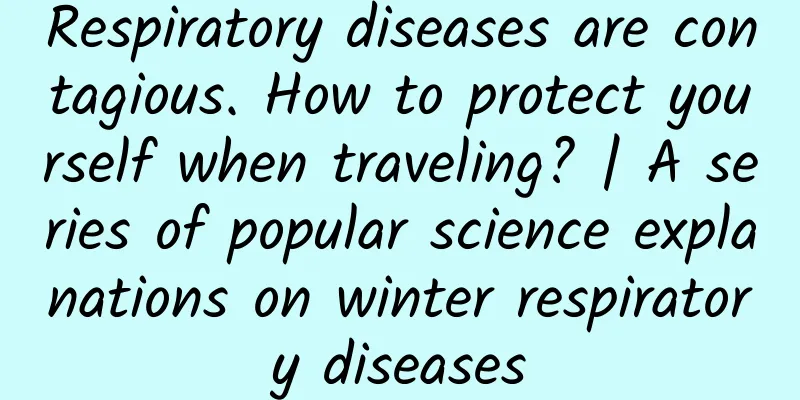Respiratory diseases are contagious. How to protect yourself when traveling? | A series of popular science explanations on winter respiratory diseases

|
Editor's note: Recently, Guangming Online's Science Channel and the "Dayi Xiaohu" medical communication think tank launched a special topic called "Winter Respiratory Disease Series Popular Science Interpretations", inviting medical experts to provide popular science interpretations on the causes, transmission routes, prevention measures and treatments of respiratory diseases. Please pay attention. Author: Qian Huijuan, Shanghai Sixth People's Hospital, School of Medicine, Shanghai Jiao Tong University Scientific review: Shen Jian, Yueyang Hospital of Integrated Traditional Chinese and Western Medicine, Shanghai University of Traditional Chinese Medicine Whoosh whoosh! Respiratory infectious diseases are now spreading quietly, and how to protect them has become a top priority. Did you know? Respiratory infectious diseases are a type of disease that is transmitted through media such as air and droplets. There are three main conditions for the spread of infectious diseases, including the source of infection, the route of transmission, and the susceptible population. How does respiratory cross-infection occur? For example, pathogens such as influenza virus, Mycoplasma pneumoniae, and adenovirus spread through respiratory droplets produced by coughing and sneezing, invade susceptible populations, and thus induce acute respiratory diseases. For example, in an indoor environment, after a patient coughs or sneezes, the droplets will hover in the air, waiting for the next target. If you enter this environment and breathe, you may inhale droplets containing the virus, leading to infection. In addition to droplet transmission, respiratory infectious diseases can also be transmitted through contact with objects contaminated by pathogens. For example, if a patient touches door handles, mobile phones and other items with his hands, if he does not wash his hands in time, and then touches the mucous membranes of the mouth, nose, and eyes, the pathogens will be brought into the body and cause infection. Therefore, keeping hands clean is also one of the important measures to prevent respiratory infectious diseases. Winter is the peak season for respiratory infectious diseases. The weather is cold and the indoor air circulation is poor, which increases the risk of virus transmission. In addition, crowded places such as schools, shopping malls, hospitals, etc. are also prone to respiratory infectious diseases. Did you know that the prevalence of respiratory infectious diseases in winter and spring is also due to the decline of people's defense ability! The elderly, children and other groups are also at high risk of respiratory diseases due to their low immunity. The Spring Festival is approaching, and the Spring Festival travel rush is imminent. The increase in the flow of people has greatly increased the risk of infectious diseases spreading. After understanding the transmission methods of respiratory infectious diseases, we can take the following measures to prevent infection. Wear a mask: You must wear a mask in public places, especially in crowded places indoors. You can choose a medical mask or an N95 mask to effectively isolate droplet transmission. Remember to wear the mask correctly and change it regularly. Keep your hands clean: It is very important to keep your hands clean at all times and in all places, especially after touching items in public places. Wash your hands carefully with hand sanitizer and running water for at least 20 seconds. If there is no water source, you can use hand sanitizer containing 75% alcohol for cleaning. Keep your distance: Try to avoid close contact with people with respiratory symptoms and keep a safe distance of at least 1 meter. If contact is unavoidable, remember to wear a mask and minimize the contact time. When respiratory infectious diseases are prevalent, it is best to avoid going to crowded places, especially staying in closed spaces. Did you know that because of poor air circulation, if someone is carrying a respiratory infectious disease in it, it will cause the germs to spread rapidly among the crowd. Don't forget to ventilate: During the Spring Festival, many people will close windows and doors, but this will make air circulation poor and increase the risk of virus transmission. It is recommended to open windows and ventilate regularly, with each ventilation time of no less than 30 minutes, 2-3 times a day. If there is heating equipment at home, maintain a suitable indoor temperature to avoid excessive heating that causes the air to be too dry. In addition, you can also use a humidifier or put a basin of water to adjust the indoor humidity. Minimize going out: Minimize unnecessary outings, especially going to crowded places, such as shopping malls and train stations. If you cannot avoid going out, such as buying New Year's goods, try to choose a time when there are fewer people. At the same time, try to minimize participation in crowded gatherings and activities. Pay attention to food hygiene: There are many kinds of food during the Spring Festival, but you should also pay attention to food hygiene. Avoid eating uncooked meat, eggs and other foods to avoid digestive tract diseases caused by food contamination. Develop healthy habits: Maintaining healthy habits such as adequate sleep, a healthy diet, and moderate exercise can help improve immunity. At the same time, avoid the impact of bad living habits such as excessive fatigue and staying up late on the body. If you have symptoms such as fever and cough, you should seek medical attention in time and inform the doctor of your travel history and contact history. At the same time, you should also pay attention to the physical condition of yourself and your family, and take timely measures to prevent and control the spread of the disease. Get vaccinated regularly: Get vaccinated regularly against respiratory infectious diseases, such as influenza vaccine, according to the recommendations of the health department. Vaccines can enhance immunity and reduce the risk of infection and the severity of symptoms. In addition to the above suggestions, there are some precautions to take: Wear disposable gloves: When touching items in public places or handling garbage, use disposable gloves to protect your hands to prevent them from being contaminated by pathogens. If your hands have wounds, use a Band-Aid or bandage them in time. In addition, when using personal items, disinfect them, such as mobile phones and door handles. Home hygiene is important: Maintaining home hygiene is also an important measure to prevent respiratory infectious diseases. Clean furniture, floors, doors and windows regularly to ensure that the environment is clean and well ventilated. Avoid contact with people with respiratory symptoms: Try to minimize contact with people with respiratory symptoms, such as coughing, sneezing, etc. If contact cannot be avoided, keep a safe distance of at least 1 meter and wear a mask. Strengthen health management: Maintain good work and rest habits to improve immunity. Proper exercise, balanced diet, and adequate sleep can all help improve the body's ability to resist viruses. Wear masks scientifically: Wear masks indoors, on public transportation, in crowded places, etc., and make sure to wear them correctly and avoid touching the outer surface of the mask. At the same time, avoid touching the outer surface when taking off the mask. Maintain good respiratory hygiene habits: do not spit, cover your mouth and nose with a tissue or your elbow when you cough or sneeze, and then throw the tissue into a closed trash can. Strengthen publicity and education: publicize knowledge on the prevention of respiratory infectious diseases through various channels, enhance the public's awareness of prevention and control, and jointly maintain social public health security. |
>>: Huh? How can someone be allergic to their own sweat?
Recommend
Should I close the doors and windows after the house is renovated? What is the purpose of closing the doors and windows after the house is renovated?
We all know that there are many things to pay att...
What should I do if my fetus has ovarian cysts?
Studies have shown that the incidence of this dis...
Women's height and weight standard
Weight is a topic that many women have always bee...
Will it be effective to take folic acid intermittently?
Women should start to check their bodies in the f...
Can breast nodules be eliminated by taking Chinese medicine?
Breast nodules generally occur in postmenopausal ...
Can pregnant women eat Panax notoginseng powder?
Pregnant women are a group of people who need spe...
How to treat uterine cold infertility?
Everyone knows that the female uterus is a very c...
Female uterus diagram
The Creator created "women" and gave th...
Can I drink soy milk during menstruation? It turns out that this is the case
As we all know, women's menstrual period is a...
What are the symptoms of gynecological fibroids
Women are very familiar with gynecological fibroi...
What to do if women have high thyroid stimulating hormone
Important reminder: When women are pregnant, the ...
Breast rash during lactation
The main reason why breast rashes appear during l...
Why does female urine smell bad?
Generally speaking, normal and fresh urine does n...
Can I get pregnant if I have sex a few days before my period?
Whether or not you will get pregnant if you have ...
In spring, you can practice "liver nourishing exercise" in the morning and evening to protect your liver.
There are many ways to nourish and protect the li...









